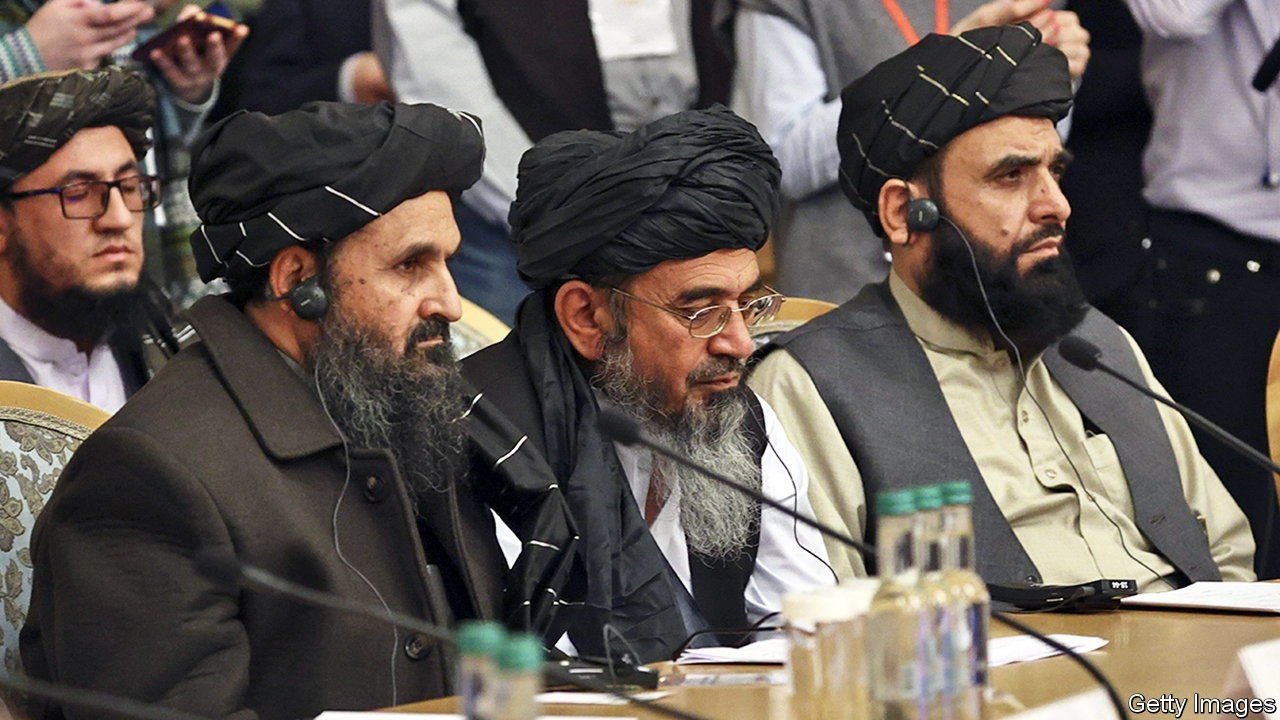WHEN THE Taliban ruled Afghanistan from 1996 to 2001, they were international pariahs. Their hospitality to global jihadists, oppression of women, medieval brutality and cultural vandalism alienated most of the world. Only three governments recognised their self-proclaimed Emirate—those of Pakistan, Saudi Arabia and the United Arab Emirates—and those were quick to turn against them after the September 11th attacks orchestrated by al-Qaeda from Afghanistan.
Twenty years on, the Taliban seem intent on ensuring that their second regime will be on a sounder diplomatic footing. Having largely avoided bloodshed in their takeover of Kabul, they are presenting themselves as a moderate, stabilising force. Unlikely allies in this effort are some supporters of a rival militant group, Islamic State, who have decried the Taliban as an “apostate militia” and even, absurdly, an American agent. The West will take some convincing of the Taliban’s apostasy, but their humiliation of America has predisposed some big countries in their favour, including China, Iran and Russia. Even these countries, however, are extremely wary of the Taliban. The victors in Kabul are a long way from achieving widespread international acceptance.
As Western governments scrambled to extricate their citizens and some local staff from the country, China and Russia have kept their embassies in Kabul open, under Taliban protection, and indicated they are ready to deal with the new regime. On August 17th the Russian ambassador, Dmitry Zhirnov, was the first foreign official to sit down with Taliban leaders in Kabul. Russia has its own memories of humiliation and failure in Afghanistan. And the chaotic scenes of the past few days at least have the merit, viewed from Moscow, of making the Soviet Union’s withdrawal from the country in 1989 look less calamitous by comparison. The Afghan government it left behind survived for three years, rather than collapsing instantly. Its fall (leading to a period of turmoil and, ultimately, to the Taliban’s taking power) was precipitated by the collapse of the Soviet Union in 1991 and the withdrawal of its financial support. The Russian government has long had contacts with the Taliban, despite listing them as a terrorist group, and prepared for their possible triumph. In July Russia played host in Moscow to a Taliban delegation.
In what seems in retrospect to have been part of a concerted diplomatic push ahead of taking power, that same month a Taliban delegation, led by Mullah Abdul Ghani Baradar, the group’s de facto leader, was also in Beijing, where it was accorded a well-publicised meeting with China’s foreign minister, Wang Yi. The official Chinese press has relished America’s embarrassment, celebrating what one commentator called the end of the “second period of US strategic profligacy” (the first having ended, in this view, with the withdrawal from Saigon in 1975).
Iran, too, has enjoyed the Great Satan’s discomfiture, and this week has maintained a diplomatic presence both in Kabul and in Herat, close to its border. Its long-standing hostility to the Taliban has moderated in recent years, with its leaders holding meetings with them. This week Iran’s new president, Ebrahim Raisi, celebrated America’s withdrawal and “military defeat” as “an opportunity to restore life, security and lasting peace to the country”.
It is not just America’s foes and rivals that have kept their doors open to the Taliban. Indeed, one has long invited them in, to make themselves at home. Pakistan has for decades balanced its close ties with America with clandestine support for the Taliban. Osama bin Laden went into hiding in Pakistan after he was forced to flee Taliban protection. And the group’s leading council is still known as the “Quetta shura”, after the city in the Pakistani province of Balochistan where it was based. This reflects an obsession held by Pakistan’s army and security services with the necessity of a friendly Afghanistan to provide “strategic depth” should relations with India deteriorate disastrously. The prime minister, Imran Khan, did not hide his glee at events in Afghanistan, congratulating its people on having “broken the shackles of slavery”.
Less effusively, Turkey’s foreign minister,Mevlut Cavusoglu, has said he “views positively” the messages the Taliban have been sending, and that Turkey is in dialogue with all sides. Even India, which has opposed the Taliban as strongly as Pakistan has backed them, is reported to have opened discreet talks with the group.
All of this suggests that it will be hard for America and its allies to prevent the Taliban from achieving diplomatic recognition. In a conversation with President Joe Biden on August 17th, Boris Johnson, Britain’s prime minister, agreed to convene a virtual summit of the G7 group of rich countries next week (which Britain currently chairs) to discuss how to approach the new order. He has argued against “anybody bilaterally recognising the Taliban”. That, however, may be hard to stop.
But America and its allies still have ways to exert influence. The Wall Street Journal has reported that the Biden administration, besides stopping shipments of cash that it had been sending to the ousted government, is also blocking the Taliban’s access to Afghan government accounts managed by the Federal Reserve and other banks, and is trying also to prevent them gaining access to foreign-exchange reserves held at the International Monetary Fund.
Moreover, the Taliban insist they will soon announce what they call an “inclusive Islamic” government. On August 17th a spokesman said “hectic” talks were under way in Doha, Qatar, not just with Afghan parties, but with America’s special envoy for Afghanistan, Zalmay Khalilzad. If the Taliban keep that promise, and the government they unveil includes a variety of allegiances and ethnicities, it will make it hard to withhold recognition (especially in the unlikely event it includes women). It is not as if the West has an alternative government to back in exile, or a resistance force to turn to, like the Northern Alliance America mobilised against the Taliban in 2001.
But even if the new government does indeed look less forbidding than the group of Taliban fighters who took over the presidential palace in Kabul on August 15th, it will take a long time for them to convince other countries that they really have changed. And among the most sceptical will be those cheering their victory the loudest. China will worry about their links with disgruntled Uyghurs in its western region of Xinjiang. Russia, too, is concerned about Islamist unrest. Iran, run by Shia Muslims who scorn the Taliban’s Sunni fanaticism, fears a renewed influx of refugees and cheap heroin. Pakistan knows it has paid a very high price for its sponsorship of the Taliban in Islamist terrorism on its own soil by Afghan-linked groups.
The question haunting Afghanistan also troubles the outside world: how much have 20 years out of power changed the Taliban? They have shown they have learned some diplomatic and political finesse, and to tailor their message to the audience; and that they would prefer recognition to renewed isolation. But a change of style cannot disguise an unchanged ideology; nor a ruthless commitment to enforcing it.
Source: Economist



